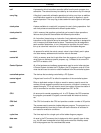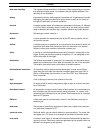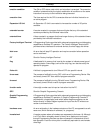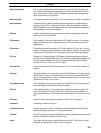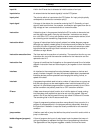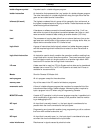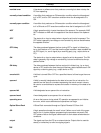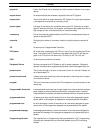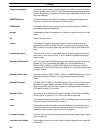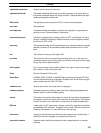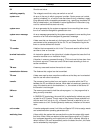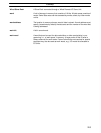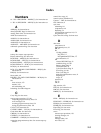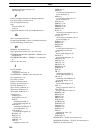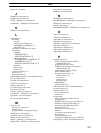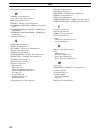
Glossary
210
Programming Device A peripheral device used to input a program into a PC or to alter or monitor a
program already held in the PC. There are dedicated programming devices,
such as Programming Consoles, and there are non-dedicated devices, such
as a host computer.
PROGRAM mode A mode of operation that allows for inputting and debugging programs but
that does not permit normal execution of the program.
PROM Writer A Peripheral Device used to write programs and other data into a ROM for
permanent storage and application.
prompt A message or symbol that appears on a display to request input from the op-
erator.
PV Short for present value.
refresh The process of updating output status sent to external devices so that it
agrees with the status of output bits held in memory and of updating input
bits in memory so that they agree with the status of inputs from external de-
vices.
relay-based control The forerunner of PCs. In relay-based control, groups of relays are wired to
each other to form control circuits. In a PC, these are replaced by program-
mable circuits.
Remote I/O Master Unit The Unit in a Remote I/O System through which signals are sent to all other
Remote I/O Units. The Remote I/O Master Unit is mounted either to a
C200H, C500, C1000H, or C2000H CPU Rack or an Expansion I/O Rack
connected to the CPU Rack. Remote I/O Master Unit is generally abbreviated
to simply “Master.”
Remote I/O Slave Unit A Unit mounted to a C200H, C500, C1000H, or C2000H Backplane to form a
Slave Rack. Remote I/O Slave Unit is generally abbreviated to simply
“Slave.”
Remote I/O System A C200H, C500, C1000H, or C2000H system in which remote I/O points are
controlled through a Master mounted to a CPU Rack or an Expansion I/O
Rack connected to the CPU Rack. K-type PCs can be connected to Remote
I/O Systems through I/O Link Units.
Remote I/O Unit Any of the Units in a Remote I/O System. Remote I/O Units include Masters,
Slaves, Optical I/O Units, I/O Link Units, and Remote Terminals.
reset The process of turning a bit or signal OFF or of changing the present value of
a timer or counter to its set value or to zero.
return The process by which instruction execution shifts from a subroutine back to
the point from which the subroutine was called. A return is automatic upon
completion of the subroutine and the return is always to.
reversible counter A counter that can be both incremented and decrement depending on a spe-
cified condition(s).
reversible shift register A shift register that can shift data in either direction depending on a specified
condition(s).



